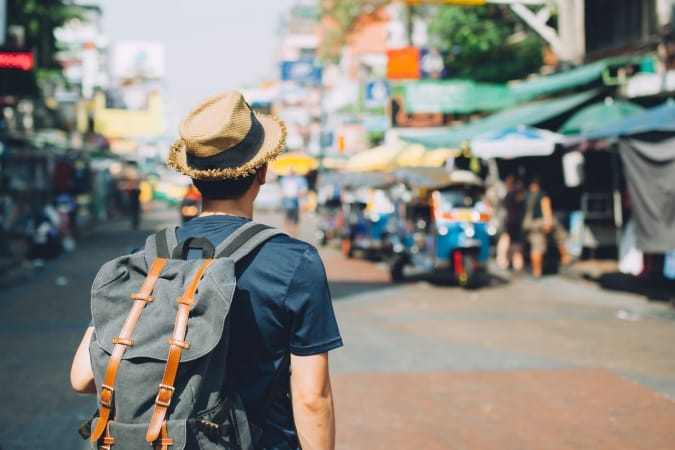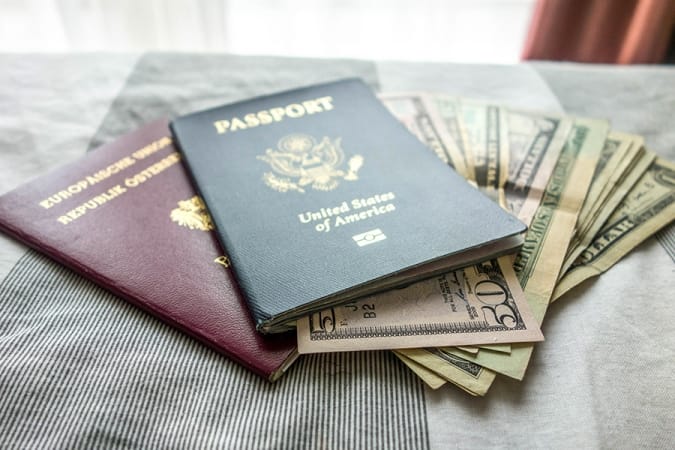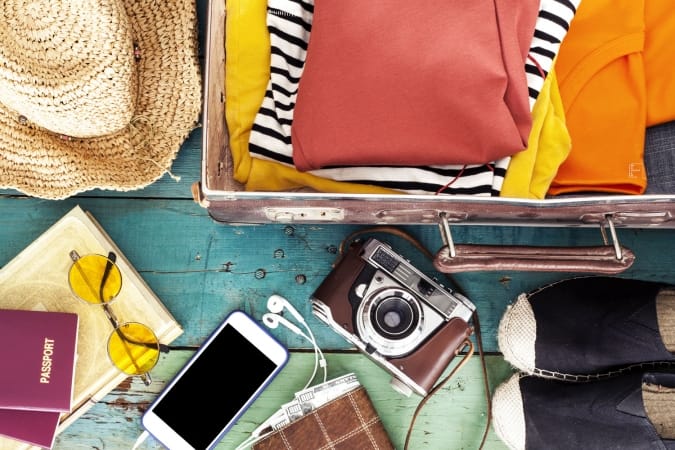No matter how often you travel abroad, there’s bound to be at least one or two things you forget to organize until the last possible moment. It’s easy to get wrapped up in the excitement of going on an international trip and forget the practical, but important, things that go along with it. So, to help you keep track of what needs to be done, here are ten key things you need to take care of before you head off on an international vacation.
1. Make Sure Your Passport and Visa are Up-to-Date
There’s no item more important for an international trip than your passport. Without it you’re not leaving the country. So once you’ve found it, check that it’s still current but also that it’s valid for at least the next six months. Regardless of the length of your trip, some countries have a firm requirement on this, so better to be safe than sorry.
If this is going to be a problem, it’s best to apply for a new passport well in advance, as an express renewal can be expensive if it’s even possible.
You also need to work out the entry requirements to the country or countries you plan on visiting. There may be a set length of time you can stay and/or a requirement to apply for a visa online or through an embassy. It’s best to check your State Department (US) or Foreign Office (UK) website well in advance so you can sort this out.
2. Get Vaccinated and Fill Prescriptions
Staying healthy while you travel is incredibly important, not only during your trip, but also once you return home. That means you need to make sure that you have everything you would normally need like medication, as well as things specifically for your trip. For starters you’ll want to fill your prescriptions to make sure you don’t run out of medication while you’re away. It’s also smart to have a small first aid kit to take with you in case of minor health problems like sprains or stomach issues.
The other big safety precaution you need to get on top of for a trip is your vaccinations. Visiting different countries often means encountering new health risks and you want to do all that you can to prevent catching anything serious. This means making sure you’re up-to-date on regular vaccinations like tetanus and diphtheria, as well as checking if there are vaccinations specific to your destination. These can include yellow fever, typhoid, and hepatitis A, but it’s best to consult websites like the Center for Disease Control and Prevention and Travel Health Pro for details. Because some vaccines need multiple shots, it’s best to get started ASAP.
3. Check for Travel Warnings and Advisories
Just because a country regularly receives tourists and has international flights in, doesn’t necessarily mean it’s a safe place to visit. Before you jet off on your international trip, you need to do your homework and find out all the safety and security concerns that are associated with your chosen destination.
Looking at your State Department (US) or Foreign Office (UK) website, you’ll see advice on any risks you may face in a destination. These can range from threats of terrorism to kidnapping and political instability, all of which may affect where in a country is safe for you to visit. These warnings often identify which parts of a country is experiencing a problem, since not all risks are country-wide. The advice also tends to be overcautious, so it’s best to use your judgement when taking it all on board. Make sure to also take a look at our travel safety tips to help you stay safe while abroad.
Another action you can take to help in case of an emergency is to register your travel plans with the appropriate government body. That way, if something does go wrong, they’ll know where you are and that you may need assistance. This is often done through your country’s Foreign Office or with an embassy through something like the Smart Traveler Enrollment Program (STEP).
4. Buy Travel Insurance
As much fun as travel is, plenty can go wrong too. No matter how well you plan, bad things can happen even to the most experienced travelers. Travel insurance exists for everything from small mishaps like bad weather all the way to serious medical emergencies.
Policies can include everything from lost luggage and delays to medical treatment and even emergency evacuation. While it might seem like yet another expense, travel insurance can save you from a huge bill should something go awry. This is particularly true with medical emergencies, since regular health insurance often won’t cover incidents abroad. Simply put, if you’re heading abroad, you need to do research and see what travel insurance is right for you. We use and recommend SafetyWing for short term travel. You can get a quick quote below.
5. Obtain an International Driving Permit
If you have any plans of driving on your trip abroad, you’ll want to get your international driving permit before going. Different countries have different laws about accepting foreign drivers licenses for cars and motorbikes, which is where the international driving permit becomes useful.
Many countries require this permit together with your drivers license for you to drive or ride a motorcycle there. What’s more, your insurance company will usually require your international permit if you are in an accident in order to pay it out. You can get your international driving permit usually from your local roadside assistance provider like AAA in the USA.
6. Get Your Money Sorted
One of the most complex and stressful parts of traveling overseas is making sure you’ll have access to your money while you’re away. The idea of being stranded in a foreign country with no access to money is something any traveler dreads. Part of the problem is that there are so many options for accessing your money overseas, each with their own drawbacks.
To get a handle on how you’ll access your funds while you’re away, you need to know which options to use and how you can best maximize their value. Travelers checks are not a viable option anymore as they’re no longer accepted in most countries. Instead, look at debit or credit cards with no foreign exchange fees. Our favorite US debit and credit cards are the Charles Schwab Debit Card and the Chase Sapphire Reserve Credit Card. If you are Canadian, check out this article on the best travel credit cards in Canada for recommendations.
Whatever you do use, be sure to let the bank know that you’re going away so they don’t block your card which will cause a hassle. You can then head to a local ATM at your destination and withdraw money. And whether you’re getting cash out or paying by card on your trip, always choose the “no conversion” option – your banks rates will almost always be preferable.
Getting money exchanged on your trip can be an option, but if you plan on doing this on your trip, you’ll need to know the conversion rates to ensure you’re getting a good rate. You’ll also want to avoid airport exchange offices as their rates are notoriously bad.
7. Pack Appropriately
Packing is often one of the things people think most about before a trip, and yet it’s hard not to fall into bad habits. Whether through forgetfulness or indecisiveness, who doesn’t make mistakes when packing for a trip?
A classic packing mistake is to overpack, trying to bring everything you might possibly need with you. Instead, leave “just in case” items at home, remembering you can always buy things when you arrive if you really need them. One item not to leave behind in this day and age is a travel adapter for your electronics. You’ll also want to ensure your electronics are dual voltage to avoid any compatibility issues.
Not packing too much will also help you keep your luggage weight down, especially since you’ll need to keep airline luggage restrictions in mind. It’s often best to just leave valuables at home, that way you don’t have to worry about them. If you do decide to bring them, never put them in your checked luggage.
8. Learn a Few Phrases in the Local Language
The value of speaking a bit of the local language can not be understated. Not only does it make getting around and interacting with people easier, but locals are also likely to be more open and welcoming towards you. By showing you’re making an effort, no matter how bad your language skills are, they’re also more likely to make an effort when helping you. Don’t underestimate how far the odd “hello” or “thank you” can go with people.
As for where to start with learning the local language, basic phrases like hello, thank you, yes/no, and excuse me are essentials. So too are numbers, words for transport like train/bus, as well as asking if someone speaks English. Apps like Duolingo can be great for learning a new language quickly, while Google Translate is always helpful to have just in case.
9. Research Your Destination
An essential part of preparing for a trip is doing all the research that helps you create a plan for your visit. While you can use that info to help craft a schedule and itinerary, that’s not quite as important as covering all the essentials. After all, you don’t want any bad surprises to pop up or to regret missed opportunities.
The obvious place to start is the weather, since the season and conditions are always going to affect what you get up to while away. Similarly, check to see if there are any festivals or major events happening. They can have a big effect, both positive and negative, on a trip so you’ll need to decide whether you want to go or avoid them.
Then there are the factors that will affect your trip’s day-to-day. Some are purely practical like understanding the local transport options and how to get from the airport to your hotel. Others, like learning about the local culture and common scams, will impact your behavior and sense of immersion.
10. Clean Your House
After coming back from a trip, the last thing you want is to be greeted with a messy, smelly house. Nobody feels like doing housework after a long flight when they’re drained by jet lag. Unfortunately, the solution to this is also housework. But by doing this before you go, you won’t come home to any unwanted work.
Just before you leave, be sure to take out the trash and clean out the fridge of all perishables. Far more pleasant to do it now before the food expires and starts to smell. You’ll also want to handle the dishes and laundry, especially so you have clean clothes to wear before getting to your travel laundry.








Comments